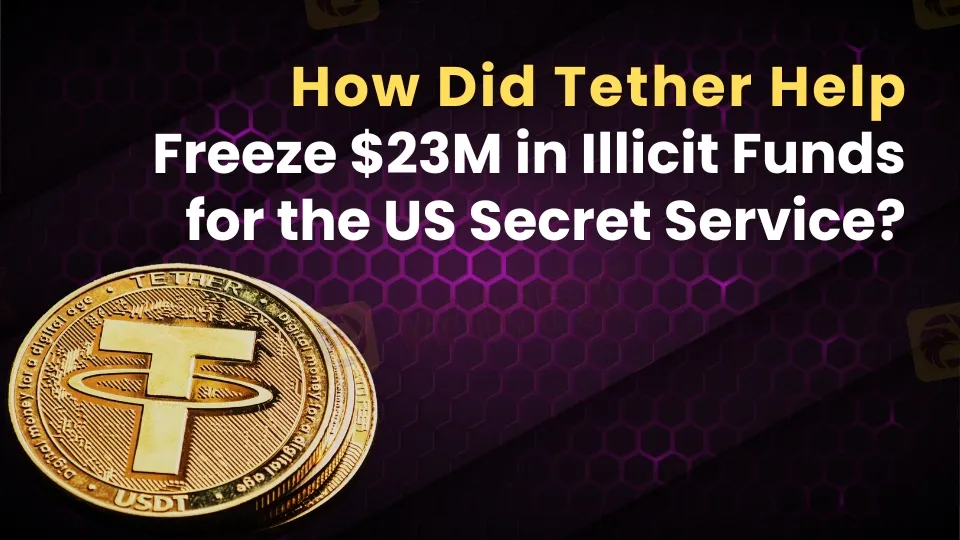PU Prime Launches “The Grind” to Empower Traders
Discover PU Prime’s new campaign, “The Grind,” and learn how trading discipline builds long-term success. Watch and start your trading journey today!
简体中文
繁體中文
English
Pусский
日本語
ภาษาไทย
Tiếng Việt
Bahasa Indonesia
Español
हिन्दी
Filippiiniläinen
Français
Deutsch
Português
Türkçe
한국어
العربية
Abstract:Tether (USDT) froze $23M in illicit funds tied to Garantex, aiding the US Secret Service. Learn how Tether combats crypto crime with global law enforcement.

Tether, the leading giant in the digital assets world, recently made headlines by teaming up with the United States Secret Service (USSS) to freeze $23 million in shady funds tied to the Russian-sanctioned exchange Garantex. This move underscores Tethers growing role in cracking down on financial wrongdoing within the crypto space.
Tethers High-Profile Crackdown on Illicit Funds
Over the past year, Tether hasn‘t just stopped there. It’s been busy collaborating with heavy hitters like the U.S. Department of Justice and the USSS, nabbing $9 million in USDT from a pig butchering scam and another $1.4 million in USDT from a tech support scam ring. Beyond these high-profile wins, Tether has locked down 2,090 wallets linked to dubious activities, with 960 of those efforts alongside U.S. agencies. Looking back three years, Tether has responded to over 900 law enforcement requests—460 from the U.S. alone—freezing a staggering $2.5 billion in USDT connected to illegal schemes. These actions highlight Tethers relentless push to bolster anti-money laundering measures.

Global Partnerships and Advanced Tools in Action
Tether‘s reach extends far, partnering with over 235 law enforcement agencies across 55 jurisdictions. Its strict wallet-freezing policy targets money laundering, terrorist financing, and even nuclear proliferation risks. Aligned with the OFAC Specially Designated Nationals (SDN) List, Tether zeroes in on wallets tied to sanctioned players and high-risk ventures. These proactive steps have turbocharged the detection and recovery of illicit funds, proving Tether’s dedication to keeping the financial world safer and compliant.
“Tethers ability to track transactions and freeze USDt linked to illicit activity sets it apart from traditional fiat and decentralized assets,” said CEO Paolo Ardoino. “We take our responsibility to combat financial crime seriously and will continue working closely with global law enforcement agencies to prevent bad actors from exploiting stablecoin technology.” His words reflect a human resolve to protect the crypto ecosystem from misuse.
The numbers back up this mission. According to TRM Labs, illicit crypto transactions dropped to $45 billion in 2024—barely 0.4% of total crypto volume. In a standout collaboration, Tether, TRON, and TRM Labs formed the T3 Financial Crime Unit, freezing over $100 million in criminal assets in the final four months of 2024 alone. Its a testament to teamwork and tech making a dent in financial crime.
Tether‘s not slowing down. By wielding cutting-edge tracking tools, it empowers law enforcement to follow USDT across blockchains, fortifying the global battle against dirty money. This isn’t just about freezing funds—it‘s about safeguarding crypto’s integrity. For a deeper dive into Tether‘s efforts, check out TetherFacts. With every wallet locked and every illicit dollar stopped, Tether proves it’s more than a stablecoin—its a guardian of trust in a digital age where vigilance matters most.

Disclaimer:
The views in this article only represent the author's personal views, and do not constitute investment advice on this platform. This platform does not guarantee the accuracy, completeness and timeliness of the information in the article, and will not be liable for any loss caused by the use of or reliance on the information in the article.

Discover PU Prime’s new campaign, “The Grind,” and learn how trading discipline builds long-term success. Watch and start your trading journey today!

IG boosts FCA compliance by integrating Adclear’s AI tools. Learn how automation accelerates marketing approvals and ensures regulatory accuracy.

Join forex expert Tom as he shares his journey, trading wisdom, and thoughts on AI and the future of forex in WikiFX’s inspiring “Inside the Elite” interview.

Robinhood is reinventing stock trading with tokenized, 24/7 equities on the blockchain—ending settlement delays and redefining how markets move.
